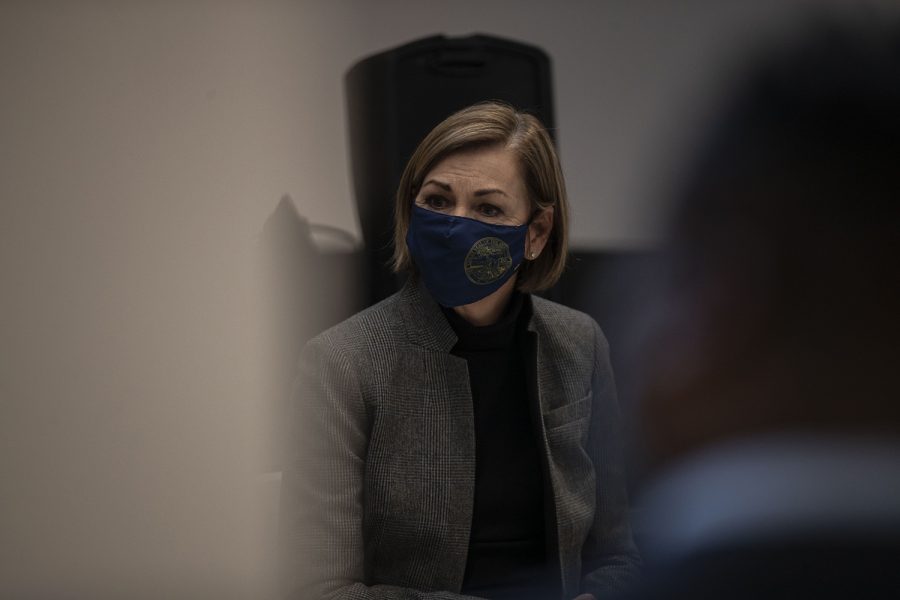Gov. Kim Reynolds addresses racial disparities in health care, announces targeted outreach group
During her press conference on Wednesday, Gov. Kim Reynolds announced that multiple organizations in Iowa will be working together to reach and inform minority communities in Iowa about the safety and efficacy of the vaccine.
Gov. Kim Reynolds listens during a conference at the GuideLink Center in Iowa City on Thursday, Feb. 11, 2021. The new crisis center is a collaborative project between the Johnson County Board of Supervisors and community partners, and focuses on providing mental health and substance use care. It will have a soft opening on Monday.
March 24, 2021
Gov. Kim Reynolds announced a collaboration between Iowa organizations to create a health care focused outreach group for minorities in the state.
Since the beginning of the pandemic, Reynolds said, there has been an increased emphasis on the disproportionate impact of COVID-19 on racial and ethnic minority groups and economically-vulnerable groups.
To combat these statistics, Broadlawns Healthcare Facility, United Way, and Corinthians Baptist Church, along with 30 nonprofit iowa-based organizations, came together to provide resources for Iowa’s minority communities, Reynolds said.
One percent of Iowans receiving the vaccine are Black, 1.6 percent are Hispanic or Latinx, while around 19 percent of people reported their race or ethnicity as unknown.
“Based on what we know about those social determinants on health literacy and healthcare access and health outcomes, targeted outreach to minorities and other vulnerable communities will better ensure that all Iowans have the opportunity to be vaccinated,” Reynolds said.
Yogesh Shaw, chief medical officer at Broadlawns Hospital, said the health care disparities that are being seen nationally and across the state have always been there, but they have learned that they need to expand access to healthcare. To address this, the outreach group will be holding a community clinic in Des Moines on Saturday to help inform members of these communities.
“I strongly feel that we can become the healthiest state when all of this COVID-19 is done,” Shaw said.
Rev. Jonathan Whitfield from Corinthians Baptists Church, said that his church is beginning to understand more and more about how beneficial the religious community can be in connecting minorities to healthcare. Seniors in his community have shared struggles with technology, language barriers, and discriminatory healthcare and he said that working together will aim to overcome these barriers.
Whitfield said he is currently trying to better inform minority groups of the positive realities of the health care system. He is aware of the history and embraces it with reality, he said, but he hopes to encourage people to get more information through lectures, workshops, and Q&A’s.
“But now we have advancements, our medical profession has grown tremendously and tehres a great gap in the advancement of medicine and the advancement of information about the advancement of medicine in the minority communities,” Whitfield said.
In addition to the community outreach, the state will also be providing financial assistance to Iowans in need.
Iowans will have access to the Iowa Rent and Utilities and the Foreclosure Prevention Assistance programs if they are on the verge of eviction and homelessness. Rent and utilities help will be available for up to 12 months and the foreclosure prevention will be available for four months or until funds are exhausted.
To learn more about how to apply, Iowans should visit this link.
Reynolds did not disclose whether or not she would be signing House File 756 into law. HF756 is a bill that would no longer require Iowans to have a permit to buy or carry a weapon, and instead that permit would be optional.
Reynolds said that the state currently has good gun laws but continues to look at any new gun legislature that comes out. She said that she focuses on issues like mental health and education that help decrease gun violence.
“I’ve been pretty clear that when we are talking about gun violence we need to take a holistic approach, there is not a single answer. We need to be following the laws that are in the books…,” Reynolds said. “We need to do everything we can to be proactive and just addressing mental health and behavioral health issues.”














